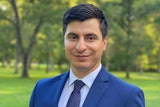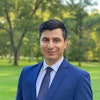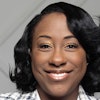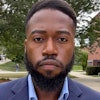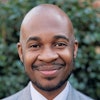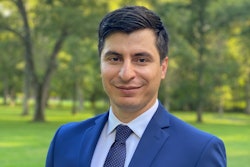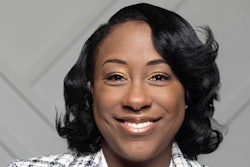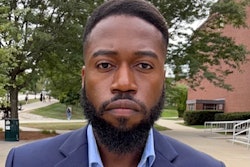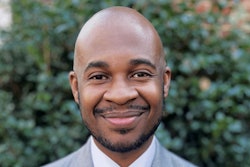Words of wisdom/advice for new faculty: ”Remember, it’s progress, not perfection. You win some and you lose some. No matter what happens, keep pushing towards greatness.”Career mentors: Dr. Trina Shanks (University of Michigan, Ann Arbor); Dr. Rogerio M. Pinto (University of Michigan, Ann Arbor); Dr. Annette Campbell Anderson (Johns Hopkins University); Dr. Sydney Hans (University of Chicago); Dr. Charles M. Payne (Rutgers University - Newark); Dr. Larry Mayo (DePaul University)
Education: B.A. in Anthropology (DePaul University); AM/MSW in International Social Work & Community Schools (University of Chicago); PhD in Global Social Work & Human Rights (University of Chicago); Provost’s Postdoctoral Fellow in Education (Johns Hopkins University)
Age: 38
Tenured: No
Title: Assistant Professor, University of Michigan, Ann Arbor School of Social Work and the Marsal Family School of Education (courtesy appointment) Dr. Ashley Cureton
Dr. Ashley Cureton
As a little girl, Dr. Ashley Cureton dreamed of adventure. Cureton, an assistant professor in the School of Social Work and the Marsal Family School of Education at the University of Michigan, Ann Arbor (U-M), voraciously pored through the books at her school library, telling the librarian she had plans to read each one and travel the world. It was innocent ambition, fenced in by her realities. Her family was poor, so much so that in the summers Cureton would miss the consistency of the lunches offered by school cafeterias.
For Cureton, education was the key to living her dreams. She became the first in her family to attend college, struggling through first-generation woes like the unfamiliarity with FAFSA, scholarships, or even how to pay for her attendance. Her trials made her keener than ever to support students from similarly marginalized backgrounds, and she became involved in multiple student affair organizations.
Following her graduation from college, she moved to South Africa. That was the first time she became involved in working with displaced refugee populations, particularly children. The experience left her with a lot of questions and a strong desire to know more. She turned again to education, earning her masters and Ph.D. in social work at the University of Chicago.
Now, Cureton has worked with refugees across the globe. She has traveled to 103 countries, including Turkey, Jordan, Uganda, Lebanon, and Switzerland. She works closely with refugee communities, sharing and amplifying their stories “with the goal of informing policies and programming on how to support these multitude of populations,” she says.
Refugees and asylum seekers, says Cureton, often become lumped with undocumented residents or migrant workers, when the legal differences between the terms make them a distinct population. Much of her early work with students has to do with unpacking those terms and misconceptions.
“There’s an idea that everyone wants to flock to the U.S. or a western country. But refugees are forced to flee their homes because of war or persecution—many of them want to go home,” says Cureton. “Their identity, sense of self-worth, histories, families, are all in those lands. To have to leave is overwhelming and devastating.”
Yet refugee communities around the world and in the U.S. are remarkably resilient, says Cureton. They are able to integrate and begin life in their new context, thrive, and bring value to societies. Cureton’s work helps to bridge those gaps, embracing refugee cultures and customs and building community while informing policy makers of her findings and research.
Cureton brings a myriad of frameworks to teach her students, including human rights, philosophy, Afrocentric theory and paradigms, indigenous practices, climate change and environmental justice, AI and the role technology plays in the world.
“[Cureton] is definitely a global citizen,” says Dr. Trina Shanks, a professor of social work, director of community engagement, and founding director of the Center for Equitable Family and Community Well-Being at U-M.
“In addition to traveling around the world for herself, she has a heart for people who are immigrants and refugees in this country, making sure their transition is smooth, that children and families have what they need,” says Shanks.
Shanks said Cureton’s ability to connect with her students has been apparent from day one. Cureton led a group of students to India one summer, and she took the time needed to prepare those travelers to consider their privilege while not projecting it, to meditate on how they can be good citizens of the world.
Cureton says she wants these trips to be “an actual exchange—not saviorism. Just an exchange of ideas, knowledge, and experiences. There are best practices in India that can inform your work in the states.”
“There’s something about exposing yourself to other cultures that makes you more open-minded, more inclusive, and challenges biases and the ways you see the world,” she says. “It really has to be informed by research, teaching, and practice.”
That’s why one of her greatest ambitions is to take a more direct hand in influencing policy, perhaps as a consultant for the UN. But that goal is aligned with her love for administration for higher education. She particularly loves teaching and the opportunity to open doors and extend ladders to students who, like her, might find college-going daunting and unfamiliar.

